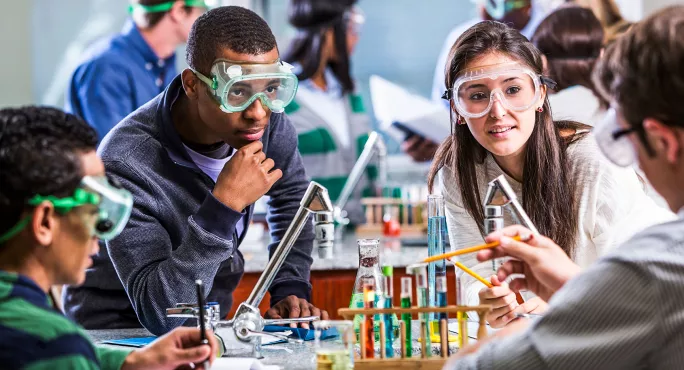
GCSE science: Sharp fall in ‘crucial’ practical work

Access to practical work for GCSE science students has fallen significantly since 2016, a report from the Royal Society has found.
Just over a quarter (26 per cent) of Year 10 and 11 students reported that they had been able to do hands-on practical experiments in their science classes at least once a fortnight in 2023.
This is far less than in 2016, when the figure was 44 per cent among students taking part in the Royal Society’s Science Education Tracker.
The decline started in 2019, when the number fell to 37 per cent, but may have been accelerated owing to Covid lockdowns, according to the Royal Society.
Practical work ‘crucial for understanding how science works’
Over the same period, the proportion of GCSE students reporting being shown a video of practical work instead of carrying it out themselves increased from 39 per cent to 46 per cent.
Practical work was considered by respondents as the most motivating aspect of science lessons. Nearly three-quarters of students said they wanted to do more practical work than they do currently.
Professor Ulrike Tillmann, the Royal Society’s Education Committee chair, said: “Access to effective hands-on learning that students can tangibly connect to the real world will help make science feel more relevant and meaningful, and provide valuable skills for life and work.
“The present situation means many young people may emerge from school without a sound appreciation of scientific methods, which are crucial for understanding how science works and being able to engage with scientific issues.”
A survey by the British Educational Suppliers Association earlier this year found that teachers reported particular concerns about having inadequate resources for science.
The Association of Science Education said at the time that inadequate resources could limit access to practical science education.
- Stem: Calls for ‘ambitious’ new strategy to tackle teacher shortage
- Science resources: ‘Outdated’ facilities are harming learning, warn teachers
- Related: Subject-specific language ‘boosts EAL pupils’ science grades’
Sarah Hannafin, head of policy at the NAHT school leaders’ union, said the decline in students having the opportunity to take part in experiments may be the result of shortages in specialist science teachers.
Ms Hannafin said it may also reflect the shift to assessing practical work through written assessment and a struggle to fit in minimum practical requirements in a packed curriculum.
“This appears to be another example of the government’s obsession with elevating written exams above all else, which NAHT has long argued against, and which does not always fairly reflect the ability of all students,” she said.
Pepe Di’Iasio, general secretary of the Association of School and College Leaders, said experiment equipment can be expensive for schools with tight budgets, and having the specialists needed to do practical work is often hard to timetable.
“All of this can lead to teachers taking the difficult decision to use video demonstrations as opposed to their preferred option of enabling students to experience experiments first hand,” he added.
Science interest and confidence also falls
The survey, which was conducted with EngineeringUK, also found that interest in science and computing has fallen since 2019, along with students’ confidence in their abilities.
Students reporting an interest in science dropped from 76 per cent in 2019 to 71 per cent in 2023 for Years 7 to 9.
This is particularly marked for girls - only 65 per cent of girls in the first three years of secondary school reported being interested in science in 2023, compared with 75 per cent in 2019.
Girls were also less likely to say they are “good” at science, with only 43 per cent reporting this compared with 53 per cent of boys.
For Years 10 to 13, girls who did not want to pursue a science, technology, engineering and maths (Stem) career were more likely than boys to say this was because they did not enjoy Stem subjects (57 per cent compared with 41 per cent) or did not feel they were good at them (38 per cent compared with 20 per cent).
‘Serious wake-up call’
In 2019, 70 per cent of Year 7s thought they might continue with science beyond GCSE. This fell to 64 per cent in 2023.
“The evidence of a declining interest in science is a serious wake-up call,” said Dr Hilary Leevers, chief executive of EngineeringUK.
“It is clear that any future government must ensure that science and computer science are taught in a way that better interests students and boosts rather than undermines girls’ confidence.”
The 2023 Science Education Tracker surveyed 7,256 secondary school students from across English state schools in Years 7 to 13.
The Department for Education has been contacted for comment.
For the latest education news and analysis delivered directly to your inbox every weekday morning, sign up to the Tes Daily newsletter
You need a Tes subscription to read this article
Subscribe now to read this article and get other subscriber-only content:
- Unlimited access to all Tes magazine content
- Exclusive subscriber-only stories
- Award-winning email newsletters
- Unlimited access to all Tes magazine content
- Exclusive subscriber-only stories
- Award-winning email newsletters
You need a subscription to read this article
Subscribe now to read this article and get other subscriber-only content, including:
- Unlimited access to all Tes magazine content
- Exclusive subscriber-only stories
- Award-winning email newsletters
- Unlimited access to all Tes magazine content
- Exclusive subscriber-only stories
- Award-winning email newsletters
topics in this article



